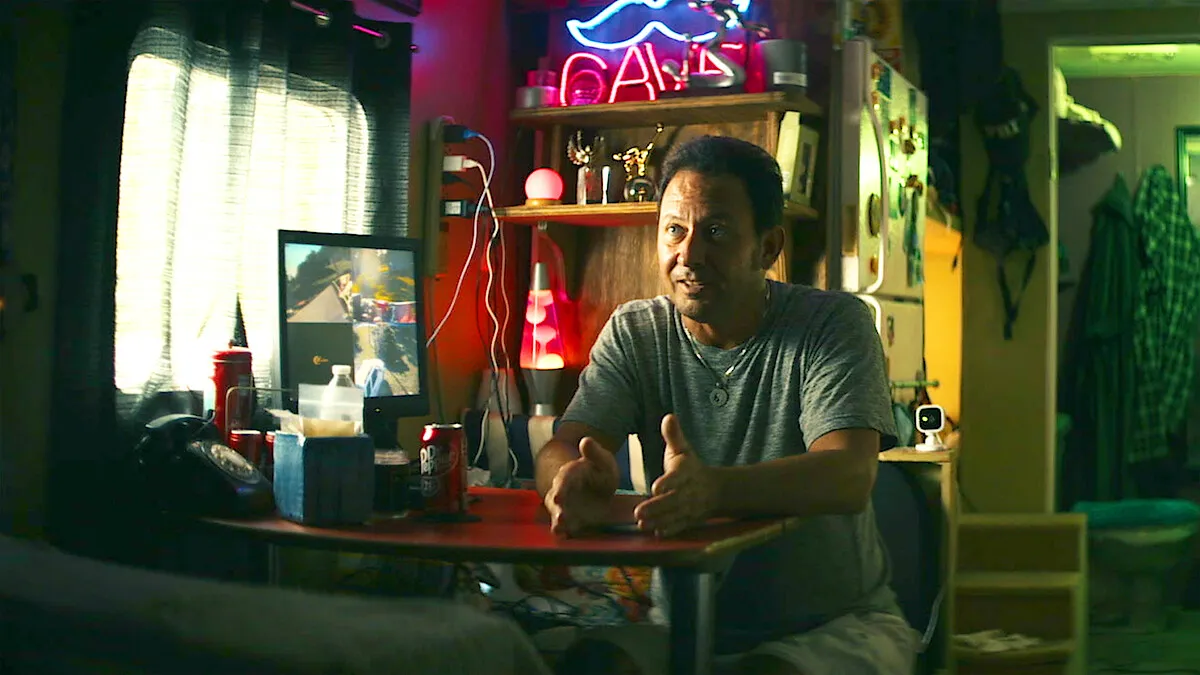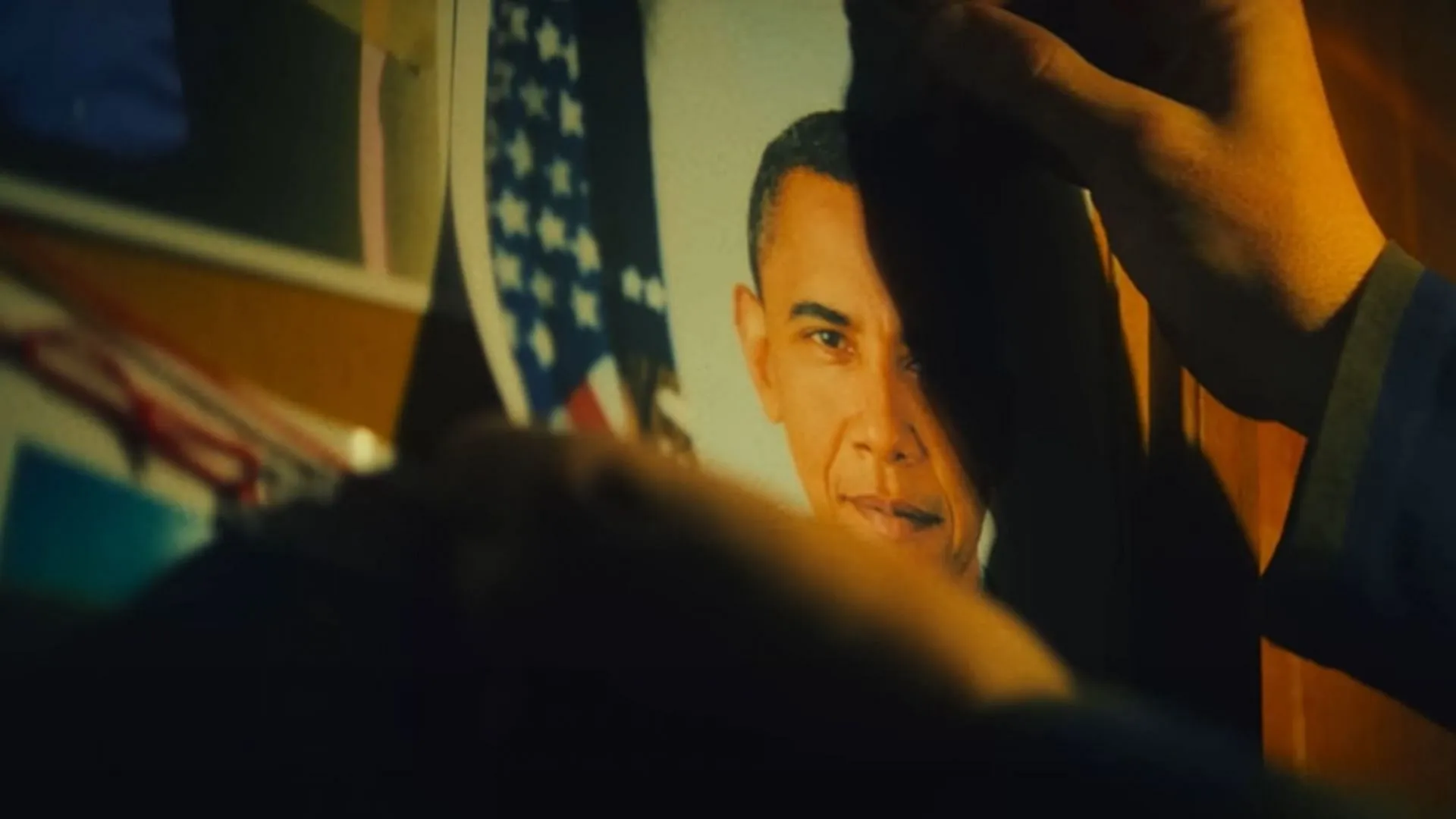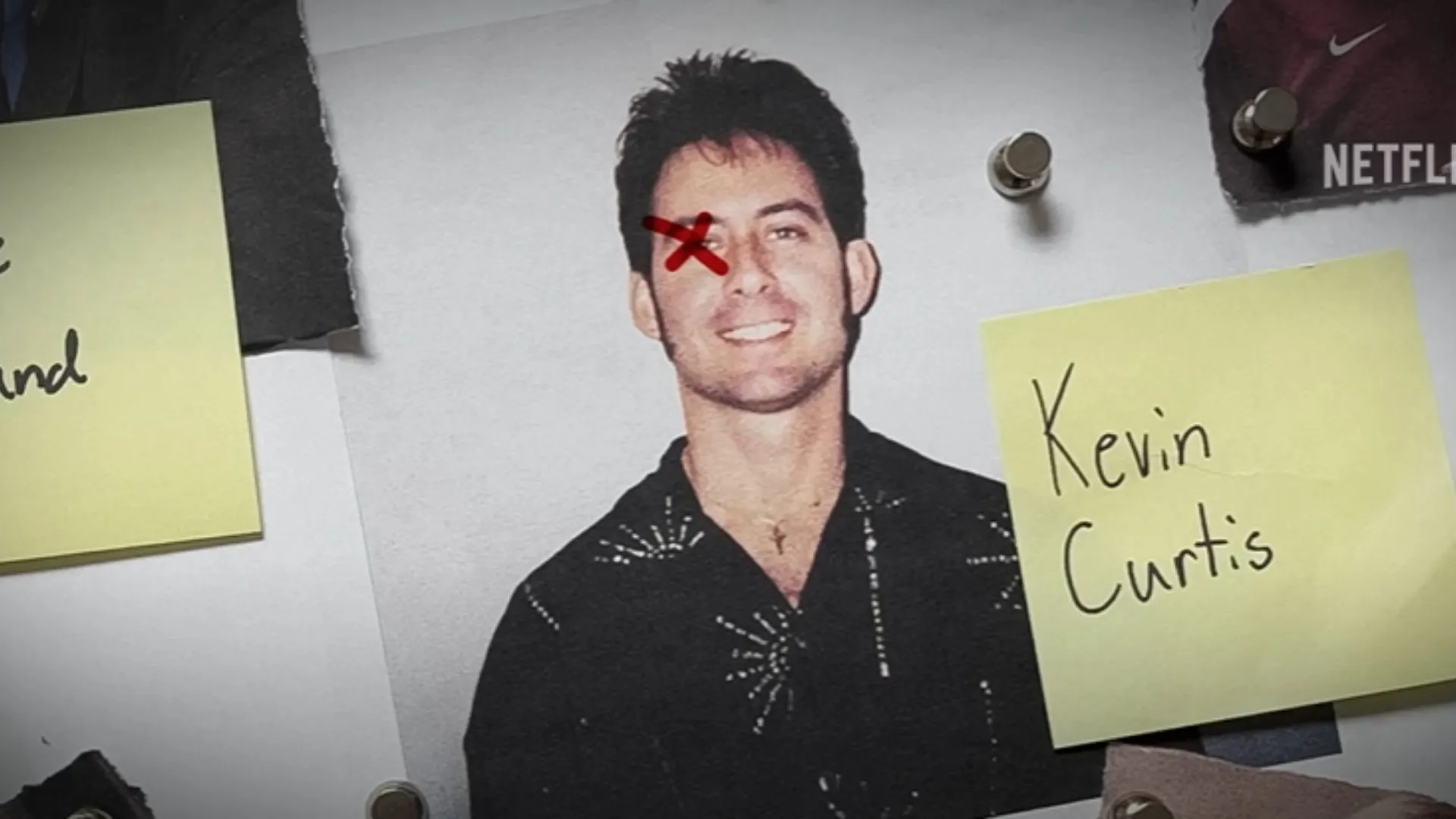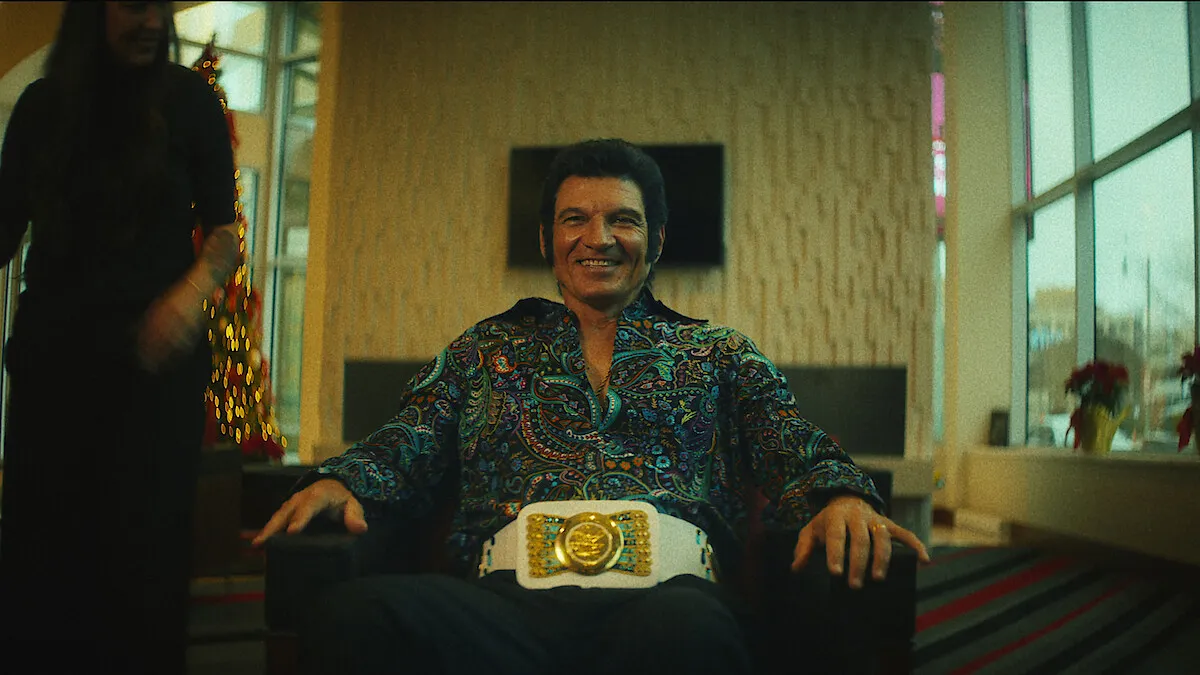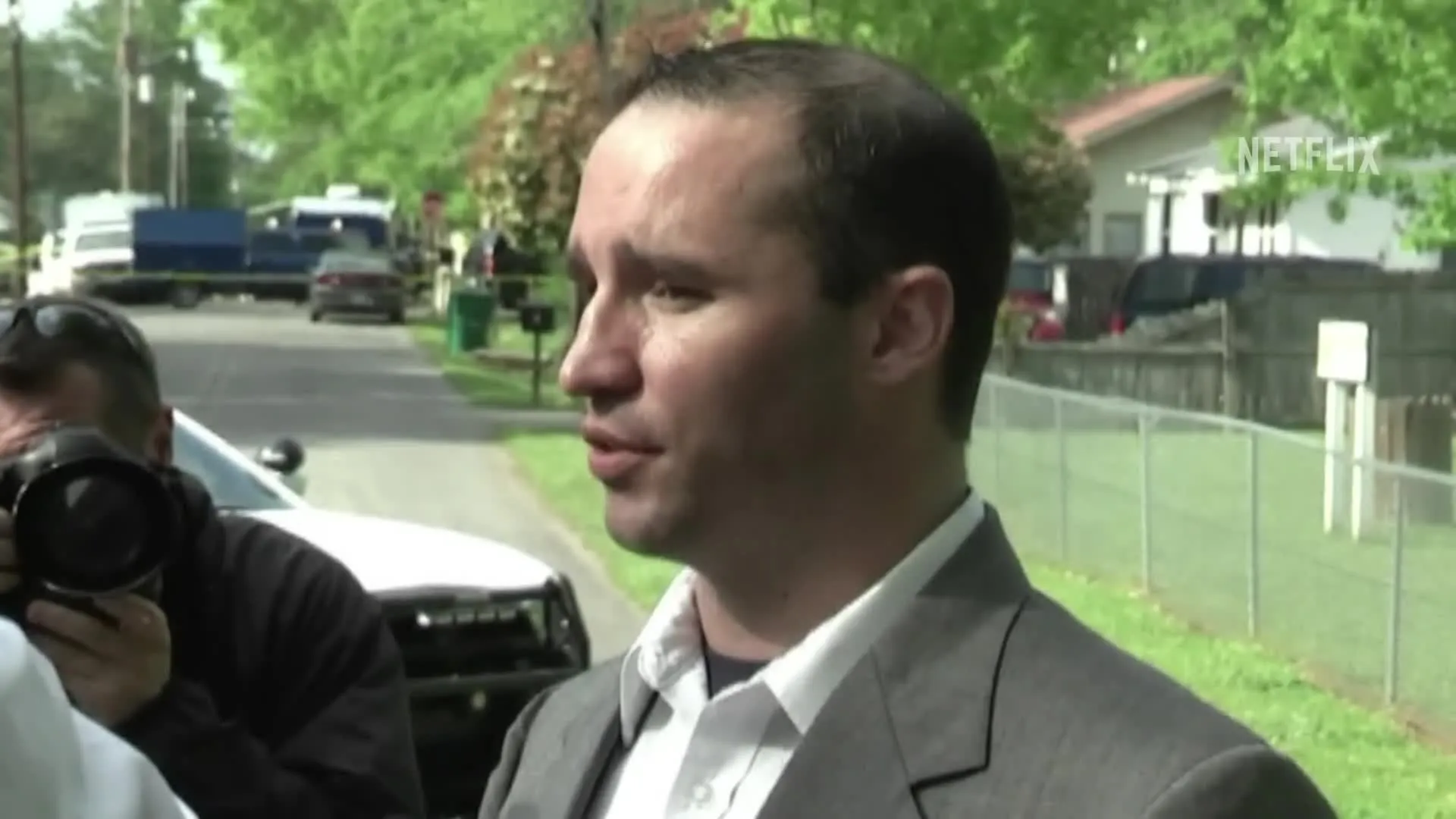In The Kings of Tupelo: A Southern Crime Saga, we meet Paul Kevin Curtis, a man whose life exemplifies the dichotomy of the American Dream: a glittering façade of success masked by severe isolation.
Curtis, born in Elvis Presley’s birthplace, became an Elvis impersonator, an act that evoked both nostalgia and longing. However, beneath the sequined veneer lies a mentality unraveling, anxiously searching for meaning in a world that feels increasingly conspiratorial and chaotic.
The decisive event of this narrative takes place within the sterile walls of a hospital morgue when Curtis discovers a grisly tableau: decapitated heads and dismembered body parts carefully cataloged like forgotten remnants of human existence.
This heinous finding plunges him into a labyrinth of conspiracy ideas, with each twist and turn reflecting an existential search for truth in a deceptive setting. What begins as a casual curiosity quickly becomes an obsession, a never-ending quest of a phantom threat lying just beneath the surface of everyday life.
As ricin-laced letters are sent to public individuals, including the President, we witness the horrific culmination of Curtis’ spiral into madness. His firm belief in a major conspiracy—an attempt to reveal secret truths—becomes a terrifying metaphor for the human condition: the struggle between reality and perception, sanity and insanity.
In this gloomy narrative, Curtis becomes both a tragic hero and a cautionary tale, embodying the fragility of the human mind when confronted with the immense unknowns of existence. The series invites us to ponder how far one might go in pursuing truth and at what cost.
The Masks We Wear: A Study of Identity and Obsession
The heart of The Kings of Tupelo: A Southern Crime Saga lies Paul Kevin Curtis, whose flamboyant persona as an Elvis impersonator masks a more profound existential struggle. Curtis personifies the complexities of human identity—an elaborate tapestry fashioned from threads of aspiration, delusion, and an unquenchable desire for acceptance.
His reasons are steeped in a frantic search for affirmation, and the echoes of his childhood reverberate like distant, haunting tunes. Curtis, raised in a community perpetually shadowed by Elvis Presley’s legacy, sought safety in performance, but this refuge turned out to be a prison of self-imposed isolation.
His plunge into conspiracy theories is not simply the result of a curious mind but reflects a more profound existential crisis. The allure of secret truths provides a sense of purpose, a way to resist the existential emptiness that gnaws at his spirit. However, as he descends deeper into paranoia, we witness the fatal irony: the more he pursues the truth, the more he loses touch with reality, becoming a figure of sympathy and despair.
Curtis is supported by a cast of characters that shed light on the cracks in his psyche. His older brother, Jack Curtis, is a dramatic contrast—methodical and grounded, yet restricted by familial loyalty that blinds him to Kevin’s breakdown. Their once-strong friendship has become a battleground for unsolved conflicts and secret resentments. Then there’s Laura Curtis, a specter of lost love whose presence exacerbates Kevin’s emotions of inadequacy and rejection. Her leaving represents not only the destruction of a marriage but also the breakdown of Kevin’s fragile sense of self.
Finally, James Everett Dutschke appears as a catalyst, a figure whose evil side intersects with Kevin’s descent. Dutschke’s intentions remain opaque, blurring the lines between victim and villain and reflecting the complicated interplay of human relationships in which trust is like a flickering candle in the wind. In this complicated dance of characters, we are forced to ponder the essence of identity itself—are we defined by our dreams, obsessions, or the shadows we cast in the lives of others?
The Shadows of Truth: Conspiracies and Familial Bonds
In The Kings of Tupelo: A Southern Crime Saga, the prevalent conspiracy culture serves as both a lens and a mirror, reflecting the deep cracks within Paul Kevin Curtis’s mind and the larger community. Curtis’ life becomes a canvas on which the colors of paranoia and obsession are painted, resulting in a sad portrayal of a man trapped by his ideas.
The allure of conspiracy theories—those alluring whispers of hidden truths—offers him a respite from the mundane, but they also distort his perception of reality, leading him down a path of isolation and suspicion. Herein lies a terrible philosophical question: What is the cost of seeking truth in an ambiguous world? As Curtis descends into a labyrinth of baseless assertions, these beliefs destroy his relationships, turning friends into foes and family into mere specters.
The idea of family and rivalry flows seamlessly into this examination of conspiracy culture. Kevin’s relationship with his brother Jack is riddled with latent tensions, revealing the deadly potential of sibling rivalry. Each meeting is colored with envy and hatred, a competitive dance threatening their partnership.
Meanwhile, Laura Curtis’ departure is a painful reminder of how the weight of obsession can weaken familial bonds. As Kevin’s world crumbles, the fundamental foundation of his identity—based on familial love and ambition—cracks, exposing the fragility of human connection in the face of unrelenting pursuit. In this story, we are forced to confront an existential quandary: Do we identify ourselves by our kindred, or do we become lost in the shadows of our own making?
The Art of Disarray: Directorial Vision in The Kings of Tupelo
In The Kings of Tupelo: A Southern Crime Saga, Chapman, and Maclain Way create a baffling and compelling narrative reflecting the tumultuous world they represent. A complex dance distinguishes their storytelling approach between dark humor and heartbreaking tension, where laughter frequently serves as a coping mechanism against the absurdity of human folly.
The Way brothers use a careful touch with pacing, enabling the narrative to unfold like a series of frightening revelations—each moment loaded with sarcasm, each twist an invitation to ponder the deeper ramifications of Curtis’ spiral into madness. In this way, editing becomes more than just a technical talent; it is also a philosophical statement on the fragmented nature of truth in a conspiracy-ridden world.
Visually, the documentary alternates between the mundane and the horrific, using cinematography that portrays the striking contrasts of small-town life in Tupelo. The camera lingers on faces carved with astonishment and charm, each picture a testimonial to the human experience—fragile, complicated, and frequently confusing. The music, which alternates between merry melodies and somber undertones, is important in echoing the characters’ emotional torment.
It raises a question that remains long after the screen goes black: How can you reconcile the beauty of life with its darker undercurrents? The Way brothers’ artistic choices allow us to interact with the narrative as passive onlookers and active players in the unfolding existential inquiry—a journey into the heart of obsession, family, and the search for meaning amid chaos.
Echoes of Elvis: The Cultural Fabric of Tupelo
In The Kings of Tupelo: A Southern Crime Saga, Tupelo, Mississippi, serves as both a backdrop and a character in and of itself. This community, steeped in Elvis Presley’s legacy, exemplifies the complexities of American identity—where the King myth looms large, creating shadows that both enlighten and obscure the lives of its residents.
The setting is deeply intertwined with the narrative, impacting the motives and aspirations of the characters. The weight of societal expectation presses down on Paul Kevin Curtis, whose identity as an Elvis impersonator is both a badge of honor and a shackle in a place that reveres the past but grapples with the present.
The phenomenon of Elvis impersonators complicates this cultural tapestry by providing a lens through which to investigate themes of imitation and authenticity. These performers navigate a delicate balance between reverence and parody, embodying the dualities of aspiration and despair.
As Curtis’ obsession escalates, it reflects not only his personal journey but also a bigger statement on the human condition—how we cling to idols in our search for meaning, often losing ourselves in the process. In this intersection of culture and personal narrative, the film asks: How much of ourselves do we sacrifice to the ghosts of individuals we admire in our desire for identity?
Fractured Realities: The Narrative Architecture of The Kings of Tupelo
The Kings of Tupelo: A Southern Crime Saga’s episodic style unfolds like a triptych, with each episode exploring obsession, identity, and the slippery nature of truth. The three-part structure allows for the gradual reveal of layers inside the story, inviting viewers to delve deeper into the characters’ complexities.
Each episode is thoughtfully produced, blending moments of comedy with serious introspection, ensuring that the episode reflects the tumultuous breakdown of Paul Kevin Curtis’ life. Each revelation feels inevitable and unexpected, echoing the unpredictable nature of the conspiracies that trap Curtis, and the meticulous pacing keeps the audience on the edge of suspense.
Critical turning points punctuate this narrative journey, each acting as a fulcrum around which the story pivots. Curtis’s discovery in the morgue, the ricin-laced letters, and the subsequent consequences are more than story devices; they are existential crises that drive characters—and viewers—to confront painful truths.
These climax moments reflect with philosophical weight, demanding meditation on the fragility of perception and the depths of the human mind. The Way brothers masterfully balance tension and release in this framework, creating a narrative about the journey into madness and the search for meaning within the chaos.
The Dance of Light and Shadow: Engaging the Audience in The Kings of Tupelo
In The Kings of Tupelo: A Southern Crime Saga, humor is an important counterbalance to the darker themes that pervade the narrative. The Way brothers expertly incorporate absurdity into their storyline, generating moments that compel laughter even among the chaos of conspiracy and misery.
This interplay relieves the weight of existential dread and highlights the absurdity of the human predicament. By enabling the audience to chuckle at the weird twists of fate that befall Curtis and those around him, the directors foster a sense of camaraderie with viewers, as if to say that we are all, in some measure, complicit in this tragicomedy of life.
However, beneath the humor lies a profound emotional resonance. Personal anecdotes and testimony are interlaced throughout the episodes, providing glimpses into the lives upended by Curtis’ obsessions. These narratives have a poignant depth that invites viewers to identify with the characters, going beyond simply entertainment.
As the audience witnesses the human cost of Curtis’ unraveling, a connection arises, drawing them into a shared examination of vulnerability and the search for meaning. The film forces us to confront the complexities of our own lives—how we navigate the bizarre, grapple with isolation, and find solace in the experiences of others—in this careful balance of humor and emotional seriousness.
The Review
The Kings of Tupelo: A Southern Crime Saga
The Kings of Tupelo: A Southern Crime Saga is a chilling look at identity, obsession, and the absurdity of human existence. The series' remarkable blend of dark humor and emotional depth pushes viewers to confront the frail borders between truth and hallucination. The Way brothers create an engaging and thought-provoking narrative, leaving a lingering sense of introspection long after the credits roll. With its deep character studies and philosophical undercurrents, this series serves as a moving reflection on life's complexities.
PROS
- Intriguing exploration of identity and obsession.
- Masterful blend of dark humor and emotional depth.
- Strong character development and personal narratives.
- Engaging episodic structure that maintains suspense.
- Visually captivating cinematography that enhances storytelling.
CONS
- Some may find the pacing uneven at times.
- The complexity of themes might overwhelm casual viewers.
- Dark themes may not appeal to all audiences.









































